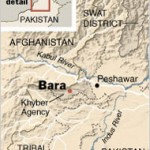Latest Post: Engagement with Iran? An Additional View of Professor Gary Sick’s Analysis
Latest Post: Muntazar al-Zaidi - Shoe-Throwing Trial Starts Today in Iraq
Evening Update (8:30 p.m.): Al Jazeera has a useful summary of the challenge facing the US military "surge", not from the enemy but from its allies. A two-day meeting of NATO defence ministers in Poland is highlighting that
few, if any, members are eager to raise their troop levels beyond token commitments. Even John Hutton, the blowhard British Minister of Defence who talked about "a struggle against fanatics that...challenges our way of life in the same way the Nazis did", is saying it is up to other NATO countries to take the first step.
As Damascus makes a major play for leadership in Middle Eastern politics, the United Nations may revive an inconvenient incident. It is reporting
additional nuclear particles from a Syrian facility bombed by Israel in September 2007 and noting that the particles cannot have come from Israeli missiles.
The
Pentagon is playing for time after
this morning's Parliamentary vote in Kyrgyzstan closing the US airbase within six months: "We continue to consider what we might be able to offer the (Kyrgyzstan) government but we're not prepared to stay at any price and we continue to look at other options that are available to us."
Afternoon Update (1:15 p.m.): The Afghanistan Foreign Ministry has tried to take advantage of President Obama's inclusion of Kabul in the US strategic review by
claiming a lead role on issues of security, development, and reconstruction: "Since a new page has been opened with America and we have had the opportunity as an ally to raise our points, we are repeating them for we believe they are essential in bringing security."
Afghanistan will also be pressing the US to extend its operation against "sanctuaries" in Pakistan.
A
series of roadside and car bombs have killed seven Iraqi soldiers and policemen and wounded more than 20 people.
North Korean military spokesmen welcome Secretary of State Hillary Clinton's forthcoming visit
with the declaration: "[South Korea's] group of traitors should never forget that the Korean People's Army is fully ready for an all-out confrontation."
Morning Update (6 a.m. GMT; 1 a.m. Washington): A Surge is Not a Surge. Now that President Obama has approved an additional 21,000 troops for Afghanistan this year, bringing the US force close to 60,000,
the military are putting out the line that this is a long-term commitment. General David McKiernan, the commander of US and NATO forces in the country, emphasized, "This is not a temporary force uplift. It will need to be sustained for some period of time, for the next three to four to five years." While some units would be in place, especially in southern Afghanistan, by the summer, "Even with these additional forces,...2009 is going to be a tough year."
McKiernan then added a statement which, if anyone is watching carefully, exposes the difficulties of the surge which is more than a surge. The general cited the causes of turmoil as "three decades of low literacy rates and rampant poverty and violence". These would seem to require more than a show of US force, but
McKiernan pressed on, "We do see, with these additional forces, an opportunity to break this stalemate, at least in terms of security conditions in the south."
Meanwhile, Secretary of Defense Robert Gates has set up another test of the US strategy,
calling on NATO allies to increase their military presence: "The [US] administration is prepared... to make additional commitments to Afghanistan, but there clearly will be expectations that the allies must do more as well." The call to arms may be met with less-than-enthusiastic responses: Italy said yesterday that it would send more 500 troops, and Georgia, angling to join NATO, has
announced it will despatch 200. However, British Foreign Minister David Miliband stalled with the claim that there had been request for more UK forces. With Barack Obama in Canada today, it will be interesting to see how Ottawa, which has been on the front-line of the Afghan effort, responds.
The Kyrgyzstan Parliament is likely to deal another blow to US plans today when
it approves the Government proposal to close the US Manas airbase, a key supply line for the military in Afghanistan.
Egypt has released the opposition leader Ayman Nour from detention because "health concerns". Nour was sentenced to five years on forgery charges in 2005, months after he finished second to Egyptian President Hosni Mubarak in elections. His case has been a prominent symbol for activists pressing for democratic reform and human rights.
 Thursday, February 26, 2009 at 12:55
Thursday, February 26, 2009 at 12:55  Have just read Marc Lynch's excellent reaction at Foreign Policy website: "Such a plan could dangerously muddle what needs to be a clear signal of a commitment to withdrawal and probably not work the way it's been presented."
Have just read Marc Lynch's excellent reaction at Foreign Policy website: "Such a plan could dangerously muddle what needs to be a clear signal of a commitment to withdrawal and probably not work the way it's been presented." Barack Obama,
Barack Obama,  New York Times,
New York Times,  US Military Policy,
US Military Policy,  US Withdrawal in
US Withdrawal in  Iraq
Iraq  Barack Obama,
Barack Obama,  New York Times,
New York Times,  US Military Policy,
US Military Policy,  US Withdrawal in
US Withdrawal in  Iraq
Iraq 
 Update:
Update: 
 Saturday's New York Times offers confirmation
Saturday's New York Times offers confirmation Evening Update (8:30 p.m.): Al Jazeera has a useful summary of the challenge facing the US military "surge", not from the enemy but from its allies. A two-day meeting of NATO defence ministers in Poland is highlighting that
Evening Update (8:30 p.m.): Al Jazeera has a useful summary of the challenge facing the US military "surge", not from the enemy but from its allies. A two-day meeting of NATO defence ministers in Poland is highlighting that